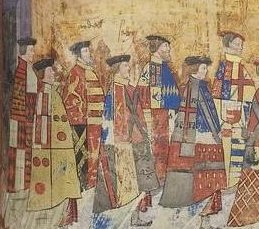Sir Henry Courtenay
Courtenay was the son of Henry VIII's aunt, Katherine of York. He spent much of his childhood in the royal nurseries with Henry VIII, Margaret, Queen of Scots and Mary, the French Queen. Nevertheless, his childhood was overshadowed by the imprisonment of his father and grandfather for alleged Yorkist conspiracies. Following Henry VIII's accession, Courtenay was permitted to inherit the title of Earl of Devon, and he served in the French wars of 1512-13 in the English navy.
Around 1515 Courtenay married his mother's ward, Elizabeth Grey, Viscountess Lisle. Elizabeth had previously been contracted to Charles Brandon, who had been permitted to use her title and lands, and he was reluctant to give them up – arguments continued for some years. Elizabeth died in 1519, aged only fourteen, so the marriage is unlikely to have been consummated. Courtneay remarried later that year to Gertrude Blount, daughter of Lord Mountjoy, and a maid-of-honour to Katharine of Aragon.
Courtenay grew close to his cousin, the King, and was appointed to the Privy Council in 1520. In 1521 he was in installed as a Knight of the Garter, and in 1525, he received the title of Marquis of Exeter.

During the late 1520s Exeter supported Henry in the annulment proceedings, although, like many of the older nobility, he was no fan of Anne Boleyn and his wife was still one of Katharine of Aragon's Ladies-in-Waiting. Lady Exeter was an outspoken supporter of Katharine, but was obliged to act as godmother to Anne Boleyn's daughter, Elizabeth. This did not, however, stop her support of Katharine and Princess Mary, and she became embroiled in the Elizabeth Barton affair, which must have been extremely embarrassing for Exeter.
In 1536, Exeter collaborated with Cromwell in Anne's downfall. However, despite allying with Cromwell over that, Exeter resented his power, and Cromwell feared Exeter's close relationship with the King. Cromwell accused Exeter of too strong support for Princess Mary, and Henry tested his loyalty by sending him with Charles Brandon, Duke of Suffolk, to suppress the Pilgrimage of Grace.
In 1538, Exeter was accused of conspiring with his cousins, Reginald Pole and Henry Pole, Lord Montague, to restore Papal authority, and possibly replace Henry himself - Exeter had a claim to be the next male heir, if James V of Scotland were discounted as a foreigner.
Exeter was arrested on 5 th November 1538. No concrete evidence of a genuine plot to overthrow the King was found, but Exeter was in control of a huge swathe of territory in the south-west of England, and Henry's fears of foreign invasion were well-founded, based on the knowledge available to the English Government. It was also possible that Exeter was leaking information from the Privy Council to either his wife, who was passing it on to Geoffrey Pole, or directly to Lord Montague, which would have been a very serious matter.
Sir Henry Courtenay
Family Tree
Although Exeter received a formal trial, presided over by Thomas Audley, Lord Chancellor, the fact that an inventory of his goods was taken the day after his arrest suggests that there was little chance of an acquittal. He was pronounced guilty by all the peers on the jury and executed on Tower Hill on 9 th December 1538.

